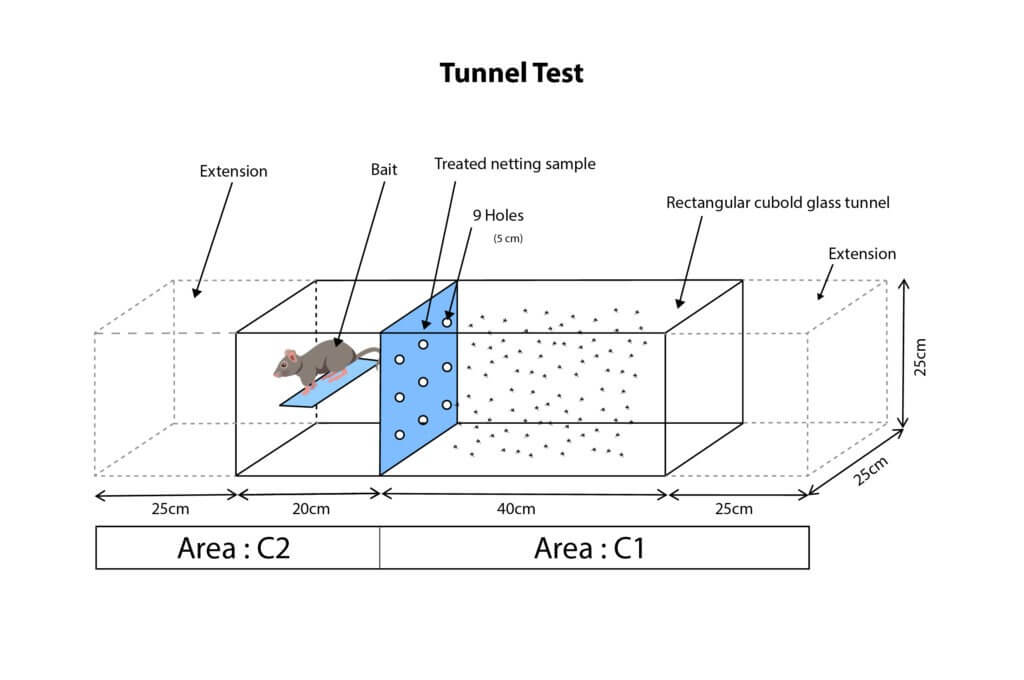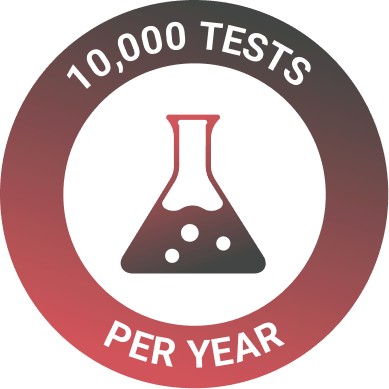Tunnel Test for Repellents
Home >> Entomology >> Tunnel Test
Tunnel Test for Insecticide treated Material
Tunnel test is used to measure the mortality (death) and blood feeding success of host-seeking mosquitoes on an insecticide treated material.
The spread of vector borne diseases (infections) has become a matter of public health concern worldwide. Among all the arthropod borne diseases, most common identified diseases are caused by mosquito bites. Therefore, vector control is continually engaged to reduce or eradicate the burden of mosquito borne diseases (infections) globally. Anti – mosquito treated material such as net fabrics and paints are extremely helpful to prevent the diseases spread by mosquitoes. The mosquito repellent test (tunnel test) is performed to assess the bio-efficacy of such anti – mosquito treated material under laboratory conditions.
Conditions Required to Perform Tunnel Test
- Non-blood-fed female anopheline mosquitoes 5–8 days are required to perform the tunnel test
- A suitable bait (e.g. guinea-pig or rabbit) for mosquito biting
- Controlled values of temperature, time exposure, and humidity conditions

Tunnel Test Procedure
- This assay is carried out in a 60-cm tunnel (25 cm x 25 cm square section) made up of glass.
- At both ends of the funnel, a 25 cm square cage covered with polyester netting is attached.
- A bait (e.g mouse) is placed in one small section of the tunnel.
- At one-third of the length, a treated test sample is placed in a disposable cardboard frame.
- 9 holes, one centimetre each are made in the netting sample to make mosquitoes reach the bait.
- At the end of the longer section of the tunnel, 50 – 100 mosquitos are exposed to treated netting samples before passing to reach the bait.
- After 15 hours of exposure, mosquitoes are removed and counted separately from each section of the tunnel.
- Dead mosquitoes are removed from the bait chamber with the help of forceps and an aspirator is used to collect the live mosquitoes.
- Live mosquitoes are kept in plastic cups with 10% sucrose solution and mortality is recorded after 24 hours.
We offer a wide range of entomology testing services for insecticide treated lotions, creams, spray and fabric. Our well-equipped lab and dedicated team of entomology experts guarantee quality assessments and analysis. For more information on the tunnel test, you can consult our experts.
FAQs
Tunnel test is a laboratory assay used to measure the mortality (death) and blood feeding success of host-seeking mosquitoes on an insecticide treated material.
Tunnel test is applicable for insecticide-treated nets (ITNs) and paint materials.
It takes 3-4 weeks to complete the Tunnel test.
Contact us for more information
Explore Other Tests
ASTME2149 | AATCC-100 | JISZ2801 | JISL1902 | EN 1276 | ISO 22196 | ISO 20743 | ISO 846 | ASTM E2180 | AATCC 147 | ASTM D7907-14 | ASTM E3031 | ASTM G29 | EN 16615 | EN 13697 | PAS 2424 | EN 1040 | EN 14349 | EN 13727 | EN 14561 | ASTM G22 | ASTM E1153 | ASTM D2574 | AATCC 174 | EN 14563 | EN 13704 | EN 1499 | EN 1500 | EN 14347 | EN 14348 | EN 1656 | EN 16437 | EN 12791 | ASTM E1174 | ASTM E2362
AATCC 30 | ASTM G21 | EN 1650 | EN 1657 | EN 13624 | EN 1275 | ASTM C1338 | ASTM D5590






